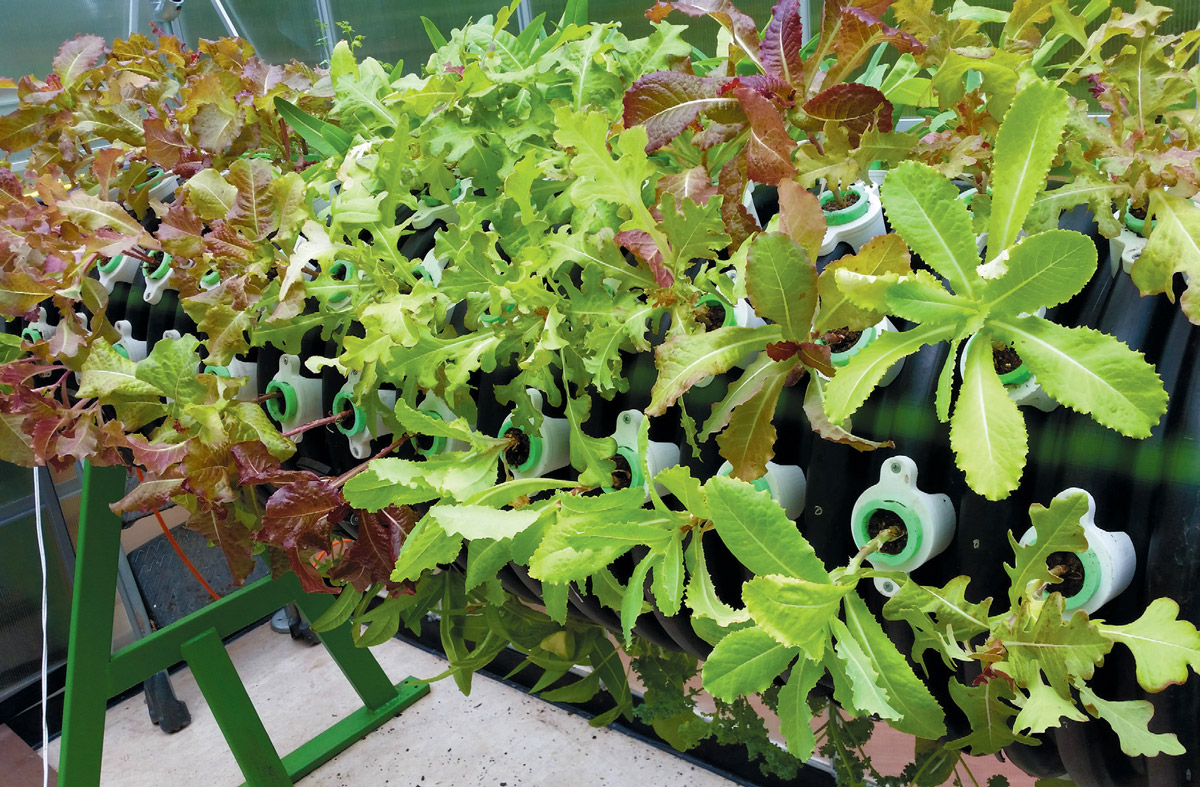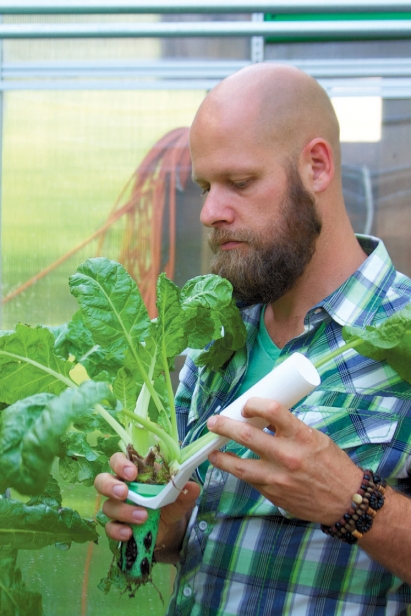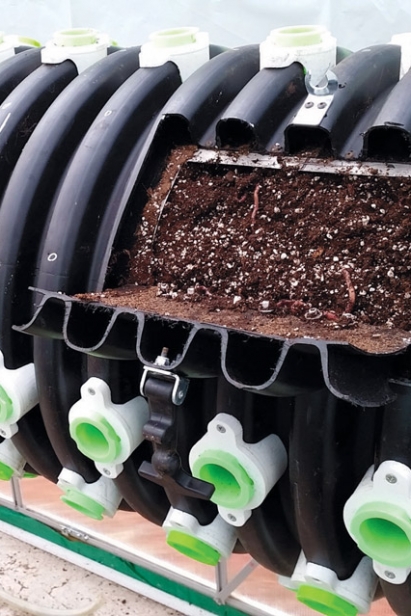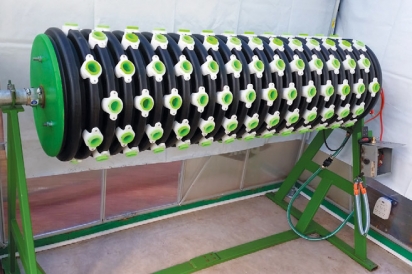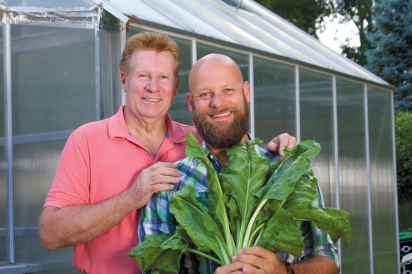The Arise Cylinder
"I tend to think in pictures.” That is how New Milford’s Mack McAleer began to answer my question about the “aha” moment behind his agricultural growing invention.
After the passing of his mother eight years ago, Mack found himself in the attic of her Atlanta home sifting through nearly a hundred years of accumulated treasure. He discovered a large, dusty stack of old Scientific American magazines, and curiosity led him to skim through several editions from the 1950s and 1960s.
On his flight home to Connecticut, he delved into a story about a NASA research project aimed at understanding the impact of gravity on plant growth. Curious, he studied the pictures of the equipment used in the research and was puzzled by their design. He thought, “Why did they do it that way?”
“It was one of those things that just rattled around in my head,” recalls Mack. “A year or so later, I saw a piece of culvert pipe, and an image popped into my head. Soon thereafter, I found myself on the back deck making the first prototype.”
GROWING A NEW TECHNOLOGY
Mack invented a soil-filled, centrally irrigated cylinder that revolves around a static axle. After having initial success growing vegetables with it, he dug around the internet to see if anything like it existed. He didn’t find anything. That’s when he told his son, Mackenze, who was living and working in Panama at the time, what he was up to.
“It was kind of a big deal for my father to tell me, ‘You need to come home and see this,’” Mackenze says with a grin. When he returned to New Milford for a visit and saw the system, he became intrigued. After studying its potential impact for the agriculture industry, Mackenze’s intrigue turned to excitement.
He decided to leave Panama and help his father turn the invention into a business. They named the company “Arise” and now have a patent-pending design that is attracting international interest.
The Arise cylinder is a geotropic growing system. Geotropism is defined as “the growth of plant organs in response to gravity.” A plant’s main root is positively geotropic, meaning it grows downward in the direction of gravitational pull, while a main stem is negatively geotropic and grows in the opposite direction, against gravity’s pull.
Think of a potted plant that tips over on its side. If left in that position, the growing parts of the stem will eventually curve upward and grow vertically again.
This biological effect is what contributes to the efficacy of the technology. Because the cylinder rotates slowly, the team believes plants detect the change in gravity and invest their energy in growing stronger root systems and stems in order to support their weight as the cylinder continuously spins them around.
“There’s no question our technology grows plants well; the real question is, what are the empirical claims versus other technologies and traditional farming methods?” says Mackenze. “We intend to demonstrate, through research, that it grows bigger plants, faster, and with higher nutrient density.”
Its key differentiator is that it is a scalable, soil-based system. This distinction attracts the attention of scientists and sets the Arise geoponic technology apart from hydroponic, aeroponic, and aquaponic systems. “Across the board, we’re more resource efficient. There’s nothing else that is self-contained and soil-based that can go vertical,” notes Mackenze, in reference to indoor growing technologies that build upward, allowing for an exponential increase in growing capacity by using vertical space, rather than being confined solely to the square footage of the floor.
Because of its centralized irrigation design, virtually 100% of the water goes directly to the plants. “The only water loss in the system is through transpiration – when the plant leaves breathe out,” states Mackenze. “Not even drip irrigation can compete with that.” And because the system is soil-based, the range of plants that can be grown includes root vegetables like potatoes or carrots, and perennials, none of which grow well in aeroponic or aquaponic systems.
FROM VISION TO REALITY
Not long ago, the Arise journey hit a new milestone when Mackenze met NASA’s Dr. Gary Stutte at an agriculture conference in Panama. Dr. Stutte works at the Kennedy Space Center and is the principle investigator for space flight experiments designed to grow plants in microgravity. He is also founder of the American Council for Medicinally Active Plants.
Sensing a once-in-a-lifetime opportunity, Mackenze struck up a conversation. When shown a picture of the cylinder on Mackenze’s phone, Stutte responded, “That thing would grow herbs like crazy!” Soon afterwards, Arise had the pleasure of welcoming the NASA scientist as a new team member and advisor.
The momentum continues to roll. The company recently participated in Village Capital’s accelerator program in Louisville, KY. The program focuses on impact investing to help companies developing sustainable agriculture technologies.
That experience helped open doors. Arise is working with one of the largest greenhouse supply distributors and with the largest gardening distributor in the U.S. to develop project plans for commercial applications from the home to the large-scale farm.
“Our goal is to build our own commercial greenhouse and centralize R&D in one place to construct cylinders for our research partners,” states Mackenze. To accomplish that, they seek to raise capital with the right investor. While they’ve had several offers to consider, the fatherson team is taking a diligent approach to finding a cohort who not only shares their business vision but also their social impact vision.
Meanwhile, until they ink a deal, Mack continues experimenting in his backyard greenhouse. He plants roughly three different crop rotations on his cylinder during the summer to better understand which plants seem to benefit most from the technology.
“It’s hard to remain patient when you feel you’re on the cusp of a game-changing innovation that can make such a meaningful difference,” says Mack as he inspects his current crop of lettuces and herbs slowly spinning on the cylinder. “Our system removes the need for special skills, making it feasible for anyone to grow,” Mackenze says enthusiastically. “By crowd sourcing the knowledge and making this an open-sourced technology, the opportunities for positive social and environmental change are seemingly endless.”
For more information about Arise, email Mackenze McAleer at z@arise.ag
Arise, LLC: 11 Standish Road, New Milford


